|
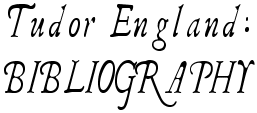
Over the years, I've read most
of the Tudor books, fiction and nonfiction, I could find. Countless
books. Good books, a few great ones, and lots of bad ones. This
page currently lists my favorite Tudor works.
|
|

When people ask me what
Tudor-related books to read, these are the ones I list:
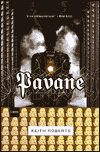 PAVANE
by Keith Roberts PAVANE
by Keith Roberts
Eventually I will be at a loss
for superlatives when describing my favorite books. PAVANE is a
beautiful book, written by one of the masters of 1960s science
fiction. It is a work of alternative history, one of the first of that
genre and perhaps the best. It begins in 1588 with the assassination
of Queen Elizabeth I and the subsequent supremacy of the Catholic faith in
England. From there, PAVANE evolves into a truly entrancing book which
explores freedom, communication, religion, etc Like The Fifth Queen, it
has a superb ending. If you haven't read this, please please please
check it out. It's recently been reissued and it's simply
wonderful. Few books strike me as deeply imagined, most walk over
familiar ground - PAVANE is a true original.
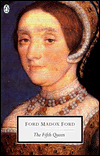 THE
FIFTH QUEEN by Ford Madox Ford THE
FIFTH QUEEN by Ford Madox Ford
I love this
book. Ford uses the life of Henry VIII's fifth queen to explore the culture of
fear, treachery, and paranoia which characterized the Tudor court.
Catherine battles Thomas Cromwell in an attempt to prevent further religious
and political change. The book is divided into three parts and
contains engrossing portraits of familiar Tudor figures; Princess Mary,
Henry VIII, Cromwell, Norfolk, Catherine herself - all are beautifully
brought to life. Ford spent years researching this
book but it is a work of fiction; liberties are taken, characterizations may
not be historically correct, etc I think it's one of the best works of historical
fiction ever written - and the ending is fantastic. As for the
'character' of Catherine, Ford creates an interesting / complex figure from
scant historical sources.
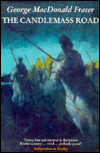 THE
CANDLEMASS ROAD by George MacDonald Fraser THE
CANDLEMASS ROAD by George MacDonald Fraser
Fraser
is justly famous as author of the Flashman novels, among the best (and
certainly the funniest) historical fiction ever. But his talent is
more expansive than even Flashman would suggest. Everything he writes
turns to gold, at least in my opinion (even the flawed 'Pyrates' had great
moments.) Long fascinated by the history
of his native Scotland, in THE CANDLEMASS ROAD, Fraser recounts the story of
Lady Margaret Dacre and her perilous life along the English-Scottish
border during Elizabeth I's reign. The writing is superb; I expect nothing less from
Fraser. My one quibble is that the book is so short - I didn't want it
to end.
THE
STEEL BONNETS by George MacDonald Fraser
This work
of history is concerned with the outlaws and Border lords (reivers) who
fought along the English and Scottish frontier for several hundred
years. It's a wonderful work of history and makes me wish more great
writers would turn to the genre; if nothing else, you're guaranteed good
writing. And this was such a fascinating time period - I'm thrilled
that one of my favorite novelists wrote its definitive history.
And if you haven't read any Flashman,
it's never too late to start....
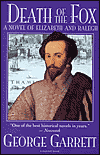 THE
SUCCESSION: A NOVEL OF ELIZABETH AND JAMES THE
SUCCESSION: A NOVEL OF ELIZABETH AND JAMES
ENTERED
FROM THE SUN: THE MURDER OF MARLOWE
DEATH
OF THE FOX: A NOVEL OF ELIZABETH AND RALEIGH
by George
Garrett
It's not enough for me that a book is set in the 16th century. I want
it to be a great book which just happens to be set in the 16th century. Every time I slumber
or groan my way through the latest awful Tudor fiction full of heaving
bosoms and Egads!-worthy dialogue, I think fondly of Fraser and
Ford and this trilogy by George Garrett....
Garrett's books should be read by
anyone with an interest in 16th century England. But they aren't read
by many, which I think is very sad - even more so when one considers the
popularity of terrible Tudor fiction. Of this trilogy, my favorite is
DEATH OF THE
FOX; Garrett brings the complex and fascinating Walter Raleigh to
life. But all three works are wonderful. ENTERED FROM THE SUN
is a nice companion piece to Anthony Burgess's A
DEAD MAN IN DEPTFORD, another good work of historical fiction.
(Burgess also wrote NOTHING
LIKE THE SUN, a fictional look at Shakespeare's love life.) And
though THE SUCCESSION has less to do with Elizabeth and James than the title
implies, it's still a fun exploration of Tudor life. I can't do these
books justice - just read them.
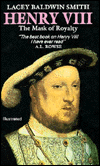 A TUDOR TRAGEDY: THE LIFE AND TIMES OF CATHERINE HOWARD A TUDOR TRAGEDY: THE LIFE AND TIMES OF CATHERINE HOWARD
HENRY
VIII: THE MASK OF ROYALTY
ELIZABETH
TUDOR: PORTRAIT OF A QUEEN
by Lacey Baldwin Smith
I've been raving about LB Smith since I started this
website. When visitors write and ask what is essential to read, I
point them to Smith's work. Unfortunately, two of the above works are
out of print. Yeah, I know - there's plenty of room for junk on
bookshelves but apparently no room for great works of history. Well,
go to Amazon.com or Barnes & Noble.com and order them used. Smith's bio of Catherine Howard
is the only one ever written which concerns Henry VIII's ill-fated 'Rose
Without a Thorn'. He collects the scant historical knowledge of her
life and creates a compelling portrait of a misguided girl and her ambitious
family (the sprawling Norfolk clan). His bio of Henry VIII is simply
the best available on the second Tudor king. It has great
psychological insight and a sharp sense of humor. After a lifetime of
studying Henry, Smith is still fascinated by the king and determined to
understand his contradictory character. But read it only after reading
a general bio of Henry VIII; the author assumes some knowledge of the Tudor
court and its cast of characters. And his brief bio of Elizabeth Tudor
is a persuasive sketch of England's most fascinating and accomplished queen.
 THOMAS
CRANMER by Diarmaid MacCulloch THOMAS
CRANMER by Diarmaid MacCulloch
This is the definitive
biography of the father of English Protestantism. Cranmer was the
archbishop of Canterbury from 1533 to 1556; he presided over the Reformation
and the creation of the Anglican Book of Common Prayer. He was burnt
at the stake as a heretic during the reign of Mary I. MacCulloch's
book is dense, literally and figuratively. But it is also a
beautifully written study of one of the most compelling lives of the 16th
century. Cranmer was a conflicted and courageous man, and deserved
such a monumental biography. MacCulloch uses sources never mentioned
in previous studies; he charts the evolution of Protestantism with an eye
for the telling detail. Personally, I am always surprised by the
number of Tudor enthusiasts who are familiar with the story of Thomas More
but have only a vague idea of Cranmer's life. Perhaps it's the
enduring popularity of A Man for All Seasons? I don't know. But
both men deserve recognition and study.
THE
PRINCE AND THE PAUPER by Mark Twain
This is
Twain's famous tale of Prince Edward, only son of King Henry VIII, and Tom
Canty, a pauper boy who is his physical twin. Twain wrote my favorite
book of all time (Huckleberry Finn) so I am biased, but this is still a
great book. The story is very entertaining and fun and there are
moments of genuine suspense and pathos. Some people classify this book
as children's literature; in fact, they say that about lots of Twain's
work. Why? He's a natural storyteller and perfect for adults.
 YOUNG
BESS YOUNG
BESS
ELIZABETH,
CAPTIVE PRINCESS
ELIZABETH
AND THE PRINCE OF SPAIN
by Margaret Irwin
Elizabeth Tudor has brought out the best in many writers, but
perhaps none more so than Margaret Irwin. This trilogy has recently
been reissued, thus earning the publisher my enduring gratitude. She
creates a vivid portrait of Elizabeth's entire life and there is the usual
colorful cast of supporting characters. Of the three books, my
favorite is the last but all are excellent. Her writing is evocative
and often very beautiful. I'll be reading along and think, What a
perfect sentence! If you want a persuasive and compelling portrait of
the Virgin Queen, read Irwin. No one else comes close.
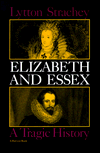 ELIZABETH
AND ESSEX: A TRAGIC HISTORY by Lytton Strachey ELIZABETH
AND ESSEX: A TRAGIC HISTORY by Lytton Strachey
This is one of my favorite books about Queen Elizabeth I. Strachey
always writes like a dream, with style and wit, and in this work he explores
the complex relationship between the Virgin Queen and the infamous earl of
Essex. Essex was the great favorite of Elizabeth's later years, but he
rebelled against the queen (his petulance was exceeded only by his
ingratitude.) Like Strachey's equally good Eminent
Victorians, this biographical study is primarily psychological.
Strachey wants to know why Elizabeth and Essex acted as they did - their
motivations, desires, flaws.... There is much room for disagreement
and often his analysis of Elizabeth's personality makes one want to analyze
Strachey himself, but this is still a great book. It brings Elizabeth
and her court to life and it pulls you deep into the story of the queen and
Essex. It also discusses the always intriguing Sir Francis
Bacon. What a fascinating bit of history!
And
once again, let me emphasize the beautiful writing. Style counts with
me. If I want a dry, boring recitation of facts, then I can pick up an
encyclopedia or, sadly, most modern histories/biographies. It's like
that famous Mark Twain quote - 'The difference between the almost right word and the right word is really a large matter; it's the
difference between the lightning bug and the lightning.'
Exactly. All of the books I've listed here are full of the right words. Anyone can tell you that Elizabeth Tudor was born
in 1533 and her mother was executed in 1536 and blah blah blah. It's
easy enough. But can the writer create a compelling story worthy of
their subject? Can they bring history to life? I hate picking up
books which are full of facts but written like - oh, they're written in a
perfectly acceptable manner. But who wants perfectly acceptable things
all the time? You want a gripping, fun, fascinating book.
ELIZABETH
I: COLLECTED WORKS
The great queen in her own
words - letters, poems, and speeches are gathered here for our admiring
perusal. This selection is arranged in chronological order and
reasonably priced.
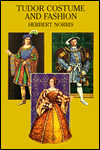 TUDOR
COSTUME AND FASHION by Herbert Norris TUDOR
COSTUME AND FASHION by Herbert Norris
Most people
believe that Janet Arnold's 'Queen
Elizabeth's Wardrobe Unlock'd' is the best work on Tudor fashion.
And it is certainly the best guide to making an Elizabethan costume.
But it's also very expensive. Norris covers the entire Tudor dynasty
and includes several color sketches; the book is published by Dover so it's
reasonably priced. If you want to learn about all the different styles
of hats/hoods and skirts and shoes, etc, this is the book for you. If
you actually want to make a Tudor costume, search out Arnold or any of the
excellent Renaissance
Festival sites.
 ERASMUS
AND THE AGE OF REFORMATION by Johan Huizinga ERASMUS
AND THE AGE OF REFORMATION by Johan Huizinga
This
is the best biography I have read of Erasmus, the great Dutch philosopher
and friend of Thomas More. He also spoke for many bookworms when he
wrote, 'When I get a little money I buy books; and if any is left I buy food
and clothes.' Those are nice words to remember when you're torn
between purchasing the
Bernini catalogue or a new outfit. Go with the books. You
can always borrow clothes from more fashionable friends and relatives.
And there are already enough well-dressed people out there. Wouldn't
you rather have a nice personal library?
Often you finish a biography and are happy you've
never met its subject (I always finish biographies of Bluff King Hal in that
mood), but sometimes it's different. Huizinga brings Erasmus and his
times to compelling life. The book includes numerous letters and
illustrations, and these are especially valuable since Erasmus corresponded
with many 16th century luminaries.
THE ROYAL PALACES OF TUDOR ENGLAND and other works by Simon Thurley
I
enjoy all of Thurley's work - his most recent is a comprehensive study of
Hampton Court - but this is easily the best study of Tudor royal architecture
ever. It is beautifully illustrated and includes floor plans of various
palaces. It also has a brief glossary. This book isn't simply
indispensable, - it's also well-written and entertaining. There are lots
of quirky facts interspersed throughout, and it does a wonderful job of
explaining various aspects of the royal household. It's expensive, yes,
but worth it. And it will make you read most Tudor fiction with a
jaundiced eye.
There are some works I haven't listed, like Tillyard's Elizabethan
World Picture and AL Rowse's two-volume
study of Elizabethan society. I've also left off Alison Plowden's
'Elizabethan
Quartet', which are wonderful introductory books on Elizabeth.
Plowden wrote the best
book I've read about Mary Tudor and Jane Grey, but it's
out-of-print. And I haven't mentioned Roy Strong's entertaining
study of Tudor portraits. There are lots that I enjoyed which I
haven't listed. I will add them eventually.
|






 A TUDOR TRAGEDY: THE LIFE AND TIMES OF CATHERINE HOWARD
A TUDOR TRAGEDY: THE LIFE AND TIMES OF CATHERINE HOWARD 



